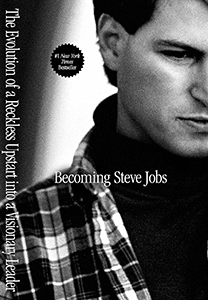Becoming Steve Jobs
“Becoming Steve Jobs: The Evolution of a Reckless Upstart into a Visionary Leader” is a biography of Steve Jobs written by Brent Schlender and Rick Tetzeli. The book offers insights into Jobs’ personal and professional life, focusing on his transformation from a young entrepreneur with a reputation for being difficult to work with to the visionary leader who co-founded Apple Inc. and revolutionized multiple industries. Here’s a summary of the key themes and insights from the book:
Key Themes:
Personal Growth and Maturity:
– The biography explores Jobs’ journey of personal growth and maturity over the course of his career. It depicts his early years as a driven but often abrasive personality and examines how he evolved into a more empathetic and reflective leader later in life.
Entrepreneurial Spirit and Innovation:
– The book highlights Jobs’ entrepreneurial spirit and relentless pursuit of innovation. It discusses his role in co-founding Apple Inc., his leadership during key product launches (such as the Macintosh, iPod, iPhone, and iPad), and his vision for integrating technology seamlessly into everyday life.
Leadership and Management Style:
– Schlender and Tetzeli analyze Jobs’ leadership and management style, emphasizing his attention to detail, insistence on design excellence, and ability to inspire and motivate his teams. They explore how Jobs balanced creativity with discipline to achieve groundbreaking innovations.
Relationships and Collaborations:
– The biography examines Jobs’ relationships with key figures in his life and career, including Apple co-founder Steve Wozniak, CEO John Sculley, and designer Jony Ive. It discusses how these collaborations influenced Apple’s success and shaped Jobs’ leadership approach.
Lessons Learned and Legacy:
– Throughout the book, the authors draw lessons from Jobs’ experiences and decisions, offering insights into entrepreneurship, creativity, and the intersection of technology and liberal arts. They reflect on Jobs’ enduring legacy as a visionary leader who transformed industries and inspired future generations.
Key Insights:
– Resilience and Adaptability: Jobs’ career was marked by setbacks and challenges, including his departure from Apple in the 1980s and his later return to lead the company to new heights. His ability to learn from failures and adapt his leadership approach contributed to his success.
– Focus on User Experience: Jobs’ emphasis on creating products that deliver exceptional user experiences and his commitment to integrating hardware and software seamlessly were central to Apple’s innovation strategy.
– Passion for Design and Simplicity: Jobs’ passion for minimalist design and simplicity influenced Apple’s product aesthetics and user interface design, setting the company apart in the technology industry.
Conclusion:
“Becoming Steve Jobs” provides a comprehensive portrait of Steve Jobs as a complex and influential figure in the history of technology and entrepreneurship. It offers readers valuable insights into his personal journey, leadership philosophy, and enduring impact on Apple Inc. and the broader tech industry. The biography is a tribute to Jobs’ evolution as a visionary leader who transformed how we interact with technology and reshaped the landscape of innovation.

